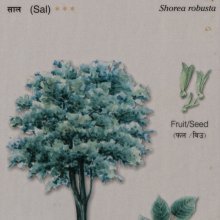Phal: 8 definitions
Introduction:
Phal means something in Hinduism, Sanskrit. If you want to know the exact meaning, history, etymology or English translation of this term then check out the descriptions on this page. Add your comment or reference to a book if you want to contribute to this summary article.
Images (photo gallery)
Languages of India and abroad
Sanskrit dictionary
Source: DDSA: The practical Sanskrit-English dictionaryPhal (फल्).—I. 1 P. (phalati, paphāla, aphālīt, phaliṣyati, phalita)
1) To bear fruit, yield or produce fruit; नानाफलैः फलति कल्पलतेव भूमिः (nānāphalaiḥ phalati kalpalateva bhūmiḥ) Bhartṛhari 2.46; परोपकाराय द्रुमाः फलन्तिः (paropakārāya drumāḥ phalantiḥ) Subhāṣ; विधातुर्व्यापारः फलतु च मनोज्ञश्च भवतु (vidhāturvyāpāraḥ phalatu ca manojñaśca bhavatu) Mālatīmādhava (Bombay) 1.16; often used transitively in this sense; मौर्यस्यैव फलन्ति पश्य विविधश्रेयांसि मन्नीतयः (mauryasyaiva phalanti paśya vividhaśreyāṃsi mannītayaḥ) Mu.2.16 'accomplish or bring about'; Śiśupālavadha 2.89.
2) To be fruitful, to be successful, to be fulfilled or accomplished, to succeed; कैकेयि कामाः फलिता- स्तवेति (kaikeyi kāmāḥ phalitā- staveti) R.13.59;15 78; यदा न फेलुः क्षणदाचराणाम् (yadā na pheluḥ kṣaṇadācarāṇām) (manorathāḥ) Bhaṭṭikāvya 14.113;12.66; नैवाकृतिः फलति नैव कुलं न शीलम् (naivākṛtiḥ phalati naiva kulaṃ na śīlam) Bhartṛhari 2.96,116.
3) To result, produce results or consequences; फलितमस्माकं कपटप्रबन्धेन (phalitamasmākaṃ kapaṭaprabandhena) H.1; फलितं नस्तर्हि भगवतीपादप्रसादेन (phalitaṃ nastarhi bhagavatīpādaprasādena) Mālatīmādhava (Bombay) 6; Kirātārjunīya 18,25; खलः करोति दुर्वृत्तं नूनं फलति साधुषु (khalaḥ karoti durvṛttaṃ nūnaṃ phalati sādhuṣu) H.3.21 'wicked men commit bad acts, and good men suffer their consequences'.
4) To become ripe, ripen.
5) To fall to the lot of, befall.
6) To be useful. -II. 1 P. (phalati, phulla or phulta in the first sense, and phalita in other senses)
1) To burst open, split or cleave asunder, burst, cleave; तस्य मूर्धानमासाद्य पफालासिवरो हि सः (tasya mūrdhānamāsādya paphālāsivaro hi saḥ) Mb.
2) To shine back, be reflected; इह नवशुककोमला मणीनां रविकरसंवलिताः फलन्ति भासः (iha navaśukakomalā maṇīnāṃ ravikarasaṃvalitāḥ phalanti bhāsaḥ) Kirātārjunīya 5.38.
3) To go.
Source: Cologne Digital Sanskrit Dictionaries: Shabda-Sagara Sanskrit-English DictionaryPhal (फल्).—r. 1st cl. (phalati) 1. To produce or bear fruit. 2. To make fruitful, to fructify. 3. To go. (ñi, ā) ñiphalā r. 1st cl. (phalati) To divide, to cleave or split.
Source: Cologne Digital Sanskrit Dictionaries: Benfey Sanskrit-English DictionaryPhal (फल्).— (sprung from original spar, cf. sphar, sphur), i. 1, [Parasmaipada.] 1. To burst, Mahābhārata 3, 1654. 2. To disappear (as if by bursting), Mahābhārata 13, 7472. 3. To produce, [Hitopadeśa] ii. [distich] 132. 4. To bear fruit, figuratively, [Mānavadharmaśāstra] 1, 84; to fall to one’s share, [Hitopadeśa] 54, 18; to befall, [Hitopadeśa] iii. [distich] 21 (sādhuṣu, the good ones). 5. To be fruitful, [Bhartṛhari, (ed. Bohlen.)] 2, 38. 6. To be useful, 2, 98. 7. Impersonal pass. phalitam (supply asti), Fruit is borne, produced, [Hitopadeśa] 21, 13. 8. † To go. Ptcple. of the pf. pass. I. phalita (or phala + ita), 1. Fruitful, bearing fruit, [Hitopadeśa] 47, 3, M.M. 2. Successful, [Daśakumāracarita] in
— With the prep. ud ud, utphulla, 1. Blown, as a flower, [Kirātārjunīya] 5, 39. 2. Expanded (as the eyes, with fear), [Rāmāyaṇa] 3, 50, 15; (with surprise, with joy), [Hitopadeśa] 51, 10, M. M.; [Indralokāgamana] 2, 26. [Causal.] phālaya, To open, Mahābhārata 1, 5977.
— With prod pra-ud, protphulla, Blown, as a flower, [Ṛtusaṃhāra] 6, 34.
— With pra pra, praphulla, 1. Blown, as a flower, [Ṛtusaṃhāra] 6, 1. 2. Smiling. 3. Shining. 4. Glad.
— With prati prati, To bound against, to be reflected, [Śiśupālavadha] 9, 37. pratiphalita, 1. Reflected. 2. Requited.
— Cf. probably [Latin] flos; [Anglo-Saxon.] blowan; [Gothic.] bloma; A. S. bloma, blostma.
Source: Cologne Digital Sanskrit Dictionaries: Cappeller Sanskrit-English DictionaryPhal (फल्).—1. phalati [participle] phulla (q.v.) burst, split ([intransitive]).
--- OR ---
Phal (फल्).—2. phalati phalate [participle] phalita (q.v.) fruit, bear fruit, have results or consequences, be fulfilled.
--- OR ---
Phal (फल्).—3. interj. = phaṭ.
Source: Cologne Digital Sanskrit Dictionaries: Monier-Williams Sanskrit-English Dictionary1) Phal (फल्):—[class] 1. [Parasmaipada] ([Dhātupāṭha xv, 9]) phalati ([Epic] also [Ātmanepada] te; [perfect tense] paphāla, [Mahābhārata, 3.] [plural] pheluḥ, [Bhaṭṭi-kāvya]; cf. [Pāṇini 6-4, 122]; [Aorist] aphālīt [grammar]; [future] phaliṣyati, [Mahābhārata]; phalitā [grammar]),
—to burst, cleave open or asunder, split (intrans.), [Mahābhārata; Rāmāyaṇa] etc.;
—to rebound, be reflected, [Kirātārjunīya; Bhāgavata-purāṇa];—([Dhātupāṭha xv, 23]; but rather [Nominal verb] [from] phala below)
—to bear or produce fruit, ripen ([literally] and [figuratively]), be fruitful, have results or consequences, be fulfilled, result, succeed, [Manu-smṛti; Mahābhārata; Kāvya literature] etc.;
—to fall to the share of ([locative case]), [Hitopadeśa];
—to obtain (fruit or reward), [Mahābhārata];
—to bring to maturity, fulfil, yield, grant, bestow (with [accusative], rarely [instrumental case]), [Mahābhārata; Kāvya literature] etc.;
—to give out, emit (heat), [Kirātārjunīya];
— ([Dhātupāṭha xx, 9]) to go (cf. √pal) :—[Causal] phālayati [Aorist] apīphalat [grammar] (cf. phālita) :—[Desiderative] piphaliṣati [grammar]:—[Intensive] pamphulyate, pamphulīti, pamphulti, [ib.]
2) cf. √sphaṭ, sphuṭ; [German] spalten; [English] split.
Source: DDSA: Paia-sadda-mahannavo; a comprehensive Prakrit Hindi dictionary (S)Phal (फल्) in the Sanskrit language is related to the Prakrit word: Phala.
[Sanskrit to German]
Sanskrit, also spelled संस्कृतम् (saṃskṛtam), is an ancient language of India commonly seen as the grandmother of the Indo-European language family (even English!). Closely allied with Prakrit and Pali, Sanskrit is more exhaustive in both grammar and terms and has the most extensive collection of literature in the world, greatly surpassing its sister-languages Greek and Latin.
See also (Relevant definitions)
Starts with (+585): Phal ku na, Phal-alu, Phal-modecca, Phala, Phala Citta, Phala Jataka, Phala Sutta, Phala-choepa, Phala-divya, Phala-hanahana, Phala-Kana-Kana-Kara-Dini-Dishi, Phala-kantak, Phala-kuhaune-aumsa, Phala-sampenga, Phala-samskara, Phalaa, Phalabandhin, Phalabandhya, Phalabdhi, Phalabhadra.
Ends with (+110): Abol samphal, Ajaya-phal, Aksikiphal, Amritphal, Angurphal, Asphal, Ataphal, Atasitaphal, Badriphal, Bambay-jayphal, Bandre phal, Bhilawa phal, Bhringi-phal, Bhutphal, Bishhaphal, Bol-samphal, Chiphal, Chirphal, Chitiphal, Damaai-phal.
Full-text (+332): Phala, Phulti, Utphala, Phalita, Pratiphala, Phulli, Phalati, Utphulla, Phalepaka, Ghanti phal, Kumbhi phal, Ram-phal, Jonka-phal, Maror phal, Mam phal, Sita phal, Goachi-phal, Phaleti, Phalin, Gila-phal.
Relevant text
Search found 9 books and stories containing Phal; (plurals include: Phals). You can also click to the full overview containing English textual excerpts. Below are direct links for the most relevant articles:
Indian Medicinal Plants (by Kanhoba Ranchoddas Kirtikar)
35. Anona reticulata, Linn. < [Annonaceae (custard apple family)]
Bodhisattvacharyavatara (by Andreas Kretschmar)
Text Section 218 / Stanza 6 < [Khenpo Chöga’s Oral Explanations]
Bibliography Of Sūtras, Tantras And śāstras
Text Section 141 < [Khenpo Chöga’s Oral Explanations]
Blue Annals (deb-ther sngon-po) (by George N. Roerich)
Chapter 14b - Gyam bzang chos rje (disciple of Zwa ra ba) < [Book 8 - The famous Dakpo Kagyü (traditions)]
Chapter 8 - Later Lineages (ii): The Dharmasvāmin zhig po < [Book 12 - Peace-Making Lineages]
Chapter 5 - The division into eighteen schools (of the Doctrine of the Buddha) < [Book 1 - The beginning of the story of the Doctrine]
Maha Prajnaparamita Sastra (by Gelongma Karma Migme Chödrön)
The 22 main Bodhisattvas < [Chapter XIII - The Buddha-fields]
Part 5 - Pañcamātra Bhikṣusahasra (section of five thousand arhats) < [Chapter VI - The Great Bhikṣu Saṃgha]
The Great Chariot (by Longchenpa)
The Homage and the Vow to Compose
A. The teaching of the establishment of the kayas and wisdoms, by completing the path < [Chapter XIII - The Fruition, the Great Self-existence]
Part 2a - The characteristics of the one to be relied upon < [C. The instruction to rely on these holy ones and abandon what is evil]
Related products







